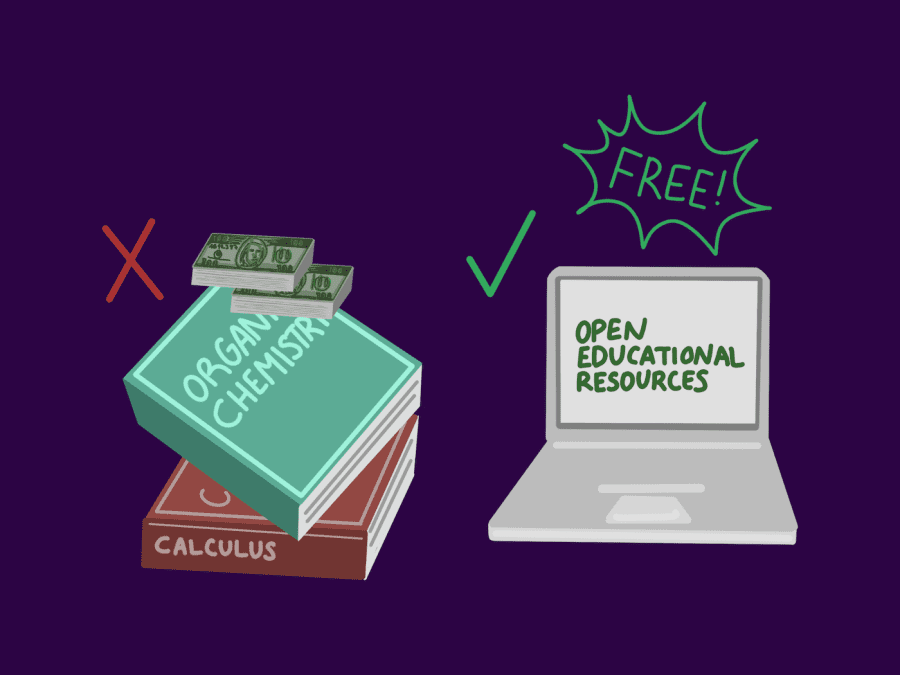Guest Essay: Textbooks should be free
Open educational resources can be the answer to addressing the financial burden of textbooks.
Open Educational Resources gives students access to useful educational material for free. (Illustration by Susan Behrends Valenzuela)
October 6, 2022
A month before school starts, we are all enjoying our summer until we get that dreaded Bursar email with the bill. You pay the bill, and you think that must be everything, until you sit down on your first day of class and see the syllabus with all the textbooks you have to buy just to participate in the class. Surely, NYU’s vast network of libraries will have the required textbooks, right?
On average, full-time undergraduate NYU students spend $752 annually on books and supplies — an increase from last year’s $718 estimate. During my first and second years at NYU, I remember having to pay $200 for a single textbook, because without it, I would be unable to do the homework or class assignments.
I am not alone in this experience. Even though it is a small portion of our entire tuition, the cost of textbooks is still burdensome to students at NYU and around the country. Around 65% of students across the nation skipped buying textbooks, despite concerns for their grades, according to the U.S. Public Interest Research Group’s education fund. But there is a potential solution — students can save money on textbooks with open educational resources.
OERs are defined by the United Nations Educational, Scientific and Cultural Organization as any educational material in the public domain that can be freely shared, revised and remixed with other material for class purposes without paying a fee. You may have used Khan Academy or Crash Course to understand a confusing topic or cram for an Advanced Placement exam, as I did — those are examples of OERs. They provide an affordable, comparable and flexible alternative to expensive textbooks. Used books, rentals and surprise online PDF documents are helpful and provide savings to students. However, the most effective way to save money for students is through OERs.
Every student should have access to the course materials to complete the class, but students cannot adopt OERs themselves. Faculty support is essential for the shift to OERs, because it is the prerogative of the professor to determine the materials that are most appropriate for the course. Ultimately, they are the best ones to judge whether or not a particular book complements course content. Some professors may be unaware that OERs exist and can be utilized in their courses. As students, we can start that dialogue.
NYU Law faculty Barton Beebe, Jeanne Fromer and Christopher Jon Sprigman have written textbooks on trademark and copyright law that are freely accessible online to law students across the country. The College of Arts & Science saved students a total of $80,000 by developing online modules for two core introductory economics courses and using OERs rather than requiring students to purchase textbooks. NYU should become the leader in OERs, not only to help its own students, but students throughout the country.
OERs have the added advantage of convenient access and open licensing, which allows for revisions to improve the inclusion of diverse voices and perspectives. This way, learning material can be tailored to the needs of the students and the learning outcomes of the class. And every student would have access to the course materials from the first day of classes.
With the help of NYU Libraries, I wrote a Letter of Support for the Adoption of Open Educational Resources to promote the use of OERs in university courses. I urge you to sign the letter to show your support. By adopting OERs, we can decrease the financial burden on students and address the issue of textbook affordability.
Ryan Carney is a Liberal Studies senator and the former director of finance of NYU’s student government.
WSN’s Opinion section strives to publish ideas worth discussing. The views presented in the Opinion section are solely the views of the writer.
Contact Ryan Carney at [email protected].



























































































































































